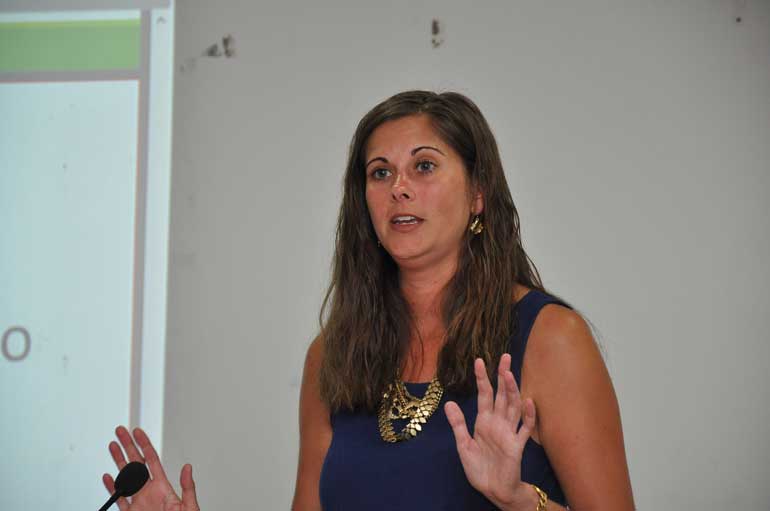Saturday Feb 21, 2026
Saturday Feb 21, 2026
Monday, 14 September 2015 00:00 - - {{hitsCtrl.values.hits}}
 Corinna Zarek
Corinna Zarek
Every citizen has a role to play in successfully implementing the Right to information (RTI) Act, and the success of it is everyone’s responsibility, said Corinna Zarek while delivering a lecture entitled ‘Right to Information; A responsibility for all’, earlier this week in Colombo.
Zarek, who is the Senior Advisor for Open Government to the US Chief Technology Officer at the White House Office of Science and Technology Policy, was speaking at the Sri Lanka Press Institute (SLPI) on 8 September.
The public lecture, organised by the US Embassy and hosted by the SLPI, was attended by media students, journalists and advocates for good governance.
“We should all understand that it is the right of the people to get information for what they pay as taxes to the Government and also hold them responsible for the promised deliverables. The enactment of an RTI Act in Sri Lanka will only enable the citizens to go before the Government and demand for information as his or her fundamental right. Therefore it becomes essential that an RTI Act prevails in any country to support good governance,” Zarek said.
She also emphasised the importance of archives and record keeping, which is a vital element of the RTI.
“More than a million Sri Lankans work for and with the Government, and they are creating records every day; even right now. Those records must be catalogued. We have to know what they are, what’s in them and how to find them,” Zarek said.
Citizens interact with the Government on a regular basis and to facilitate the entire Act this routine of record keeping should be well in place. Zarek said that archives and records management was one of the most important foundations of the RTI, and she hoped the new draft of the Sri Lankan RTI bill would encompass a section on records management.
Furthermore, enacting the RTI means government employees or civil servants suddenly have a new legal responsibility with every record they create which could be subjected to release.
“That’s a new way of working and thinking. It will take some time to change the culture in the Government, and a huge education and training campaign must be considered in order to achieve awareness of what the law is,” said Zarek.
She also said that even after passing the Freedom of Information Act (FOIA) in the US in 1966 there still remained the need to create awareness and train government officials on their responsibility and the importance of record keeping.
It was also emphasised that an ongoing awareness campaign on RTI at all levels in the country was vital for greater dissemination. Coming 49 years after the enactment of the FOIA in the US, it is still found that people do not have the knowledge and understanding as to how it could be applied or accessed. Therefore it is a must that while training for officials continues, the citizens, especially those at the grassroots should be made aware through long-term ongoing programs of how they can utilise RTI.
In conclusion, Zarek said that India had a very strong model of the RTI for Sri Lanka to look towards for guidance. Zarek said that after India enacted the RTI law in 2005, the country had been making very good use of it. Since the laws, cultures and governments of India and Sri Lanka were somewhat similar, India could be looked upon as a guide for best practices and support.
The Sri Lanka Press Institute (SLPI) was set up by the Newspaper Society of Sri Lanka, The Editors’ Guild of Sri Lanka, the Free Media Movement and Sri Lanka Working Journalists Association with its main aims being to assist, encourage and facilitate the Press to exercise and uphold its freedom and be responsible to the Public.
The SLPI is the countrys leading institution that envisages development of media in Sri Lanka through professional training and upholding ethics. It has two major divisions - the Sri Lanka College of Journalism (SLCJ), which handles the training of journalists, and the Press Complaints Commission of Sri Lanka (PCCSL), which acts as a mediator between the public and the media.